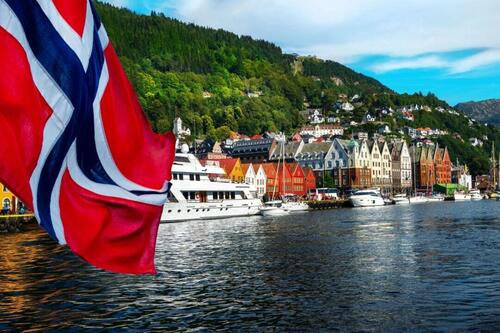Norway is witnessing an unprecedented exodus of its wealthiest citizens, as heavy taxation drives billionaires and entrepreneurs to seek refuge elsewhere. The government’s aggressive tax policies are prompting concerns about economic repercussions and draw striking parallels to Ayn Rand’s “Atlas Shrugged.”
How Billionaires Became An Endangered Species In Norway

Key Takeaways:
- Wealthy individuals are leaving Norway due to high wealth and exit taxes.
- The exodus is resulting in significant revenue losses for the Norwegian government.
- Critics warn that these tax policies threaten job creation and economic growth.
- Some politicians celebrate the departure as progress toward economic equality.
- The situation mirrors themes from Ayn Rand’s “Atlas Shrugged,” highlighting the risks of over-taxation.
Norway Faces an Exodus of Wealth
Norway, long known for its robust economy and high standard of living, is now grappling with an unexpected challenge: the mass departure of its wealthiest citizens. A combination of aggressive tax policies has led to an exodus of billionaires and entrepreneurs, raising concerns about the country’s economic future.
The Wealth Tax Sparks Flight
In June 2023, Kjell Inge Røkke, a fishing magnate turned industrialist with an estimated wealth of $5.1 billion, announced his move to Lugano, Switzerland. “My capital will continue working in Norway,” Røkke assured. Despite his promise, his departure was projected to cost the Norwegian government 175 million kroner annually—roughly $16 million. He was among dozens who left following the passage of Norway’s wealth tax.
Critics had warned that the wealth tax would “trigger capital flight and threaten job creation,” a prediction that swiftly materialized. Norwegian reporter Rupert Neate noted that more “super-rich people” left Norway in 2022 than during the previous 13 years combined.
Doubling Down with an Exit Tax
Rather than reconsidering their approach, Norwegian lawmakers introduced an “exit tax” targeting those who choose to leave. The tax imposes a 37.84% levy on unrealized capital gains in shares and securities when a resident relocates from Norway. Anti-capitalist voices praised the move, with some declaring that Norway isn’t rolling out the red carpet for the rich.
However, entrepreneurs felt differently. Fredrik Haga, co-founder of Dune.com, moved to Switzerland, citing the burdensome wealth tax on illiquid assets. “It doesn’t matter if you’re running a loss-making startup with no cash flow… you still owe the tax,” Haga wrote. With dividend and capital gains taxes around 38%, he lamented, “You’re essentially paying taxes to pay taxes, draining capital from your business without any personal financial gain.”
A Modern-Day Berlin Wall?
Haga didn’t mince words when comparing Norway’s policies to historical symbols of oppression. “The Norwegian government chose to build its very own Berlin Tax Wall with yet another tax on unrealized gains,” he stated. His frustrations echo a broader sentiment among entrepreneurs who feel stifled by the increasing tax burden.
At the offices of the Socialist Left Party, a “Wall of Shame” displays portraits of the wealthy individuals who have left Norway. For some politicians, this exodus is a point of pride. Writers like Sam Pizzigati of Inequality.org express approval, noting that Norway might soon be the world’s most equal nation—albeit without any billionaires.
Echoes of ‘Atlas Shrugged’
The unfolding situation in Norway bears a resemblance to Ayn Rand’s dystopian novel Atlas Shrugged . In the book, industrialists abandon a society that overburdens them, taking with them their innovation and productivity. Fredrik Haga himself referred to Norway as a “real-life Atlas Shrugged.”
A passage from John Galt’s speech in the novel resonates with current events: “We are on strike, we, the men of the mind. We are on strike against self-immolation.” The parallels highlight the potential risks of policies that drive away those who contribute significantly to the economy.
The Economic Implications
Entrepreneurs are often considered the lifeblood of an economy, fueling growth and job creation. Economist Ludwig von Mises emphasized this in his work Human Action , stating, “In eliminating the entrepreneur one eliminates the driving force of the whole market system.”
As more entrepreneurs leave, Norway may face unintended consequences. The loss of wealthy individuals could result in decreased investment, innovation, and economic dynamism. While some celebrate the pursuit of equality, others warn that hating the rich is not the same as loving the poor.
Looking Ahead
Norway’s commitment to progressive taxation poses a complex challenge. Balancing social equity with economic vitality requires careful consideration. The departure of the country’s wealthiest citizens serves as a stark reminder of the delicate interplay between tax policy and economic health.
As Norway charts its path forward, the question remains: will the pursuit of equality come at the expense of prosperity?











